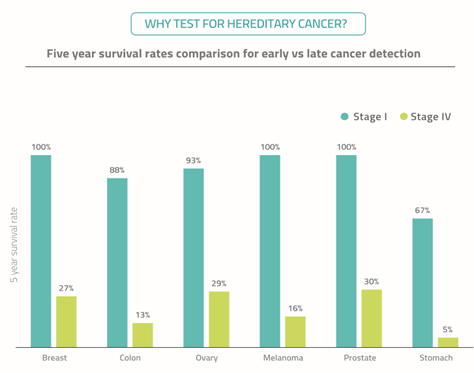Understanding Genetic Testing for Cancer
Genetics is the field of science that looks at how traits (such as eye color) are passed down from parents to their children through genes.
Genes are pieces of DNA (deoxyribonucleic acid) inside our cells that tell the cell how to make the proteins the body needs to function. DNA is the genetic “blueprint” in each cell.
Changes in genes, called mutations, play an important role in the development of cancer. Changes in genes, called mutations, play an important role in the development of cancer. Certain mutations can cause cells to grow out of control, which can lead to cancer. Still, only about 5% to 10% of all cancers are thought to be strongly related to an inherited gene mutation. Most cancers start because of acquired gene mutations that happen during a person’s lifetime.
Hereditary Cancer Testing:
Hereditary cancer testing is used to detect inherited gene mutations that might put a person at higher risk of getting certain kinds of cancer (most common of which are breast, colorectal and ovarian). Mutations in the BRCA1 and/or BRCA2 genes increase the likelihood of developing breast and/or ovarian cancers. Mutations in the Lynch syndrome genes (e.g., MLH1, MSH2, MSH6, PMS2 and EPCAM) increase the likelihood of developing Lynch syndrome cancers (e.g., colorectal, uterine, etc.).
All cancers are caused by mutations, or changes in DNA. Most cancers develop from random mutations, however 5-10% are hereditary. Therefore, knowing if you carry a hereditary mutation will allow you to make better informed decisions about hereditary cancer prevention.
Genetic testing can detect or diagnose the cause of a personal or family history of cancer. It can also help to identify family members that are at risk for certain cancers or diseases. If you have a gene mutation, then there is a 50% chance your siblings will also have it.
Who should be tested?
Some of these questions include, but are not limited to:
- Have you or your family members been diagnosed with cancers/tumors that you have been told are usually rare, such as ovarian or pancreatic cancer?
- Have you or a family member been diagnosed with more than one cancer?
- Have you or a family member been diagnosed with cancer at young age (e.g., ≤45 years)?
- Have multiple people on the same side of your family had cancer?
- Have any of your family members been found to have a cancer gene mutation (e.g., BRCA1 or BRCA2)?

